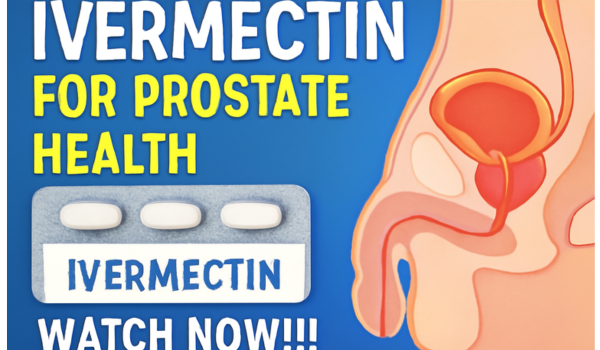Ivermectin for Prostate Health
Prostate health is a topic that becomes more important as men age. From benign prostatic hyperplasia (BPH) to prostate cancer, issues related to the prostate can significantly impact quality of life.
Ivermectin for Prostate Health | Powerful Potential Benefits for Prostate Wellness [2025]
As research continues to evolve, new potential treatments for prostate health are always under exploration. One of the drugs that has recently garnered attention, though mostly in the context of its use for other conditions, is ivermectin.
Originally developed as an antiparasitic medication, ivermectin has sparked curiosity about its possible benefits for prostate health, particularly in the context of prostate cancer.
In this blog post, we’ll explore what ivermectin is, how it works, and the current research surrounding its use for prostate health. Is it a viable treatment? What do we know so far? And should you consider it as part of your approach to maintaining prostate health?
What is Ivermectin?
Ivermectin is a medication that is primarily used to treat a variety of parasitic infections. It has been particularly effective against diseases such as onchocerciasis (river blindness), lymphatic filariasis, and strongyloidiasis, among others.
The drug works by binding to specific chloride channels in the nervous system of parasites, leading to their paralysis and death.
While ivermectin is a well-known antiparasitic, it has also been used for other off-label purposes, including treatment for scabies, head lice, and even certain viral infections.
More recently, its potential anticancer properties have begun to be explored, particularly in relation to prostate cancer.
This new area of interest stems from ivermectin’s ability to affect various cellular pathways, which may also influence the growth and spread of cancer cells.
Ivermectin and Prostate Health: The Connection
While ivermectin is not traditionally associated with prostate health, some recent studies have suggested it might have a potential role in treating prostate cancer or managing prostate-related conditions. But how could an antiparasitic drug impact the prostate?
Here are a few potential mechanisms by which ivermectin could affect prostate health:
1. Inhibition of Cancer Cell Growth
Ivermectin has been shown in laboratory studies to have anti-cancer effects, including inhibiting the growth of various cancer cell lines.
In particular, ivermectin may interact with several proteins involved in cancer cell survival and proliferation. For example, it may help reduce the activity of androgen receptors, which play a significant role in the growth of prostate cancer cells.
By blocking these receptors, ivermectin could potentially slow or halt the growth of cancerous cells in the prostate.
2. Inducing Apoptosis (Cell Death)
One of the critical aspects of cancer therapy is inducing apoptosis, or programmed cell death, in malignant cells. Ivermectin has been found to trigger apoptosis in certain cancer cell lines, including prostate cancer cells.
This means it could potentially help eliminate abnormal prostate cells, thus slowing the progression of prostate cancer.
3. Modulating Inflammatory Pathways
Chronic inflammation is a known risk factor for the development of cancer, including prostate cancer. Ivermectin has demonstrated anti-inflammatory properties, which could be beneficial in reducing inflammation within the prostate.
By modulating inflammatory pathways, ivermectin might help prevent the development or progression of prostate diseases.
4. Impact on DNA Repair
Ivermectin has also been shown to influence DNA repair mechanisms in some cancer cells. This is important because defects in DNA repair can contribute to the spread of cancer.
By inhibiting the repair of damaged DNA, ivermectin could potentially prevent the further progression of prostate cancer.
What Does the Research Say About Ivermectin for Prostate Health?
While the theoretical mechanisms for ivermectin’s potential benefits in prostate health are promising, it’s crucial to evaluate what scientific research has actually demonstrated.
Research on ivermectin specifically for prostate conditions is limited, and much of the data comes from preclinical (animal or cell culture) studies rather than human trials. Here’s a summary of the research so far:
Positive Findings
In laboratory studies, ivermectin has shown a potential to inhibit the growth of prostate cancer cells. Several studies on cancer cell lines have shown that ivermectin can suppress the proliferation of these cells and induce apoptosis (programmed cell death).
These effects suggest that ivermectin might slow the progression of prostate cancer in its early stages or prevent its spread.
For example, some studies have shown that ivermectin can interfere with androgen receptor signaling, which is essential for prostate cancer growth.
Since testosterone and its more potent form, dihydrotestosterone (DHT), stimulate prostate cancer cells, blocking the androgen receptor could help reduce the cancer’s growth. Ivermectin has been shown to have this blocking effect in lab studies.
Lack of Human Trials
Despite these promising lab results, there is a lack of large-scale human clinical trials to confirm ivermectin’s effectiveness in treating prostate cancer or other prostate-related health issues. Most of the current research is based on in vitro (test tube) studies and animal models.
While these studies provide valuable insights into how ivermectin works on a cellular level, translating these results into human therapies requires much more evidence.
Mixed Results in Animal Studies
Some animal studies have shown that ivermectin can slow the growth of prostate cancer, while others have shown no significant effect.
This discrepancy suggests that while ivermectin may have some potential as a treatment for prostate health, it is not a guaranteed solution, and further research is needed to understand its effectiveness in humans.
Potential Benefits of Ivermectin for Prostate Health
While the current research is still in its early stages, several potential benefits of ivermectin may appeal to those looking for alternative or adjunctive treatments for prostate health:
- Non-invasive Treatment Option: Ivermectin, if proven effective, could be an alternative to invasive treatments like surgery or radiation therapy for prostate cancer, particularly in early stages.
- Hormonal Regulation: By modulating the androgen receptor, ivermectin may help manage the hormonal influence on prostate cancer, which is driven by testosterone and DHT. This could be particularly useful in managing prostate cancer progression in men with high testosterone levels.
- Anti-inflammatory Effects: Chronic inflammation is linked to the development and progression of prostate disease, particularly prostate cancer. Ivermectin’s ability to reduce inflammation could make it a useful adjunct in managing these conditions.
- Low Toxicity: When used appropriately for its intended purposes (such as antiparasitic treatment), ivermectin is generally considered safe with minimal side effects. If proven effective for prostate health, it might offer a safer option compared to more aggressive treatments.
Risks and Considerations
Despite its potential benefits, ivermectin is not without risks, and there are several important considerations for anyone thinking about using it for prostate health:
1. Unproven Efficacy
As mentioned earlier, ivermectin’s effectiveness in treating prostate conditions, including prostate cancer, is largely unproven.
While some preclinical studies show promise, there is insufficient evidence from human clinical trials to support its use for prostate health.
2. Side Effects and Interactions
Ivermectin is generally safe when used as prescribed for parasitic infections. However, when taken outside of its approved uses, there may be unknown side effects.
Ivermectin can interact with other medications, particularly those affecting liver enzymes or those that have a sedative effect. Always consult with a healthcare provider before using ivermectin for off-label purposes.
3. Delaying Proven Treatments
Relying on ivermectin for prostate cancer or BPH could delay more effective, evidence-based treatments. Prostate cancer, especially in its advanced stages, requires timely medical intervention, including surgery, radiation, or hormone therapy.
Using an unproven therapy like ivermectin could delay appropriate care, potentially leading to worse outcomes.
How to Approach Ivermectin for Prostate Health
If you are considering ivermectin as part of your prostate health strategy, it is crucial to take a cautious and informed approach:
- Consult Your Healthcare Provider: Before trying ivermectin or any other unproven treatment, talk to your doctor. They can help you understand the potential risks and benefits based on your individual health condition and guide you toward the most effective treatments.
- Focus on Proven Methods: While emerging treatments like ivermectin are worth keeping an eye on, the foundation of prostate health remains healthy lifestyle choices—regular exercise, a balanced diet, maintaining a healthy weight, and managing stress.
- Stay Informed: Keep an eye on the latest research regarding ivermectin and prostate health. As clinical trials progress, new data may emerge that could change our understanding of its potential use.
- Consider Clinical Trials: If you are open to experimental treatments, consider enrolling in a clinical trial. Trials for new therapies (including ivermectin) are conducted under strict protocols, ensuring safety and monitoring for effectiveness.
Conclusion
While the potential for ivermectin in prostate health is intriguing, it is important to understand that much of the research is in its early stages.
Currently, there is no definitive evidence that ivermectin is effective for prostate conditions such as BPH or prostate cancer. However, some preclinical studies suggest it could have a role in inhibiting cancer cell growth and reducing inflammation.
Until more robust clinical trials are conducted, ivermectin should not be considered a standard treatment for prostate health.
If you are considering ivermectin or any alternative treatment, it is essential to consult with your healthcare provider and explore evidence-based options for managing prostate health.
As always, maintaining a proactive approach to prostate health through regular screenings, a healthy lifestyle, and open communication with your doctor is key.
.




